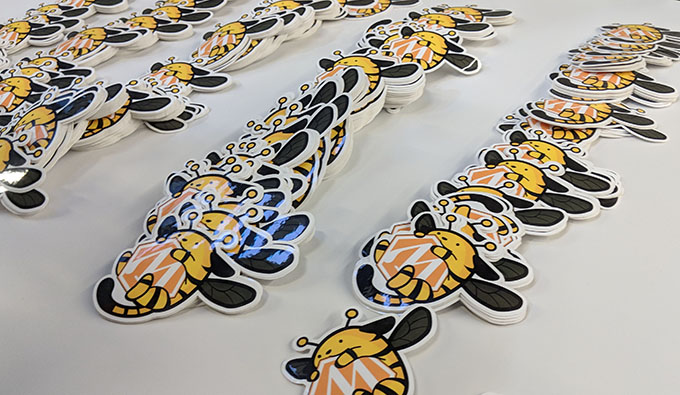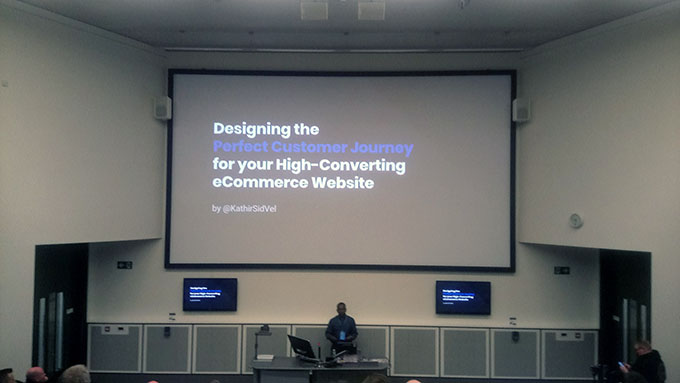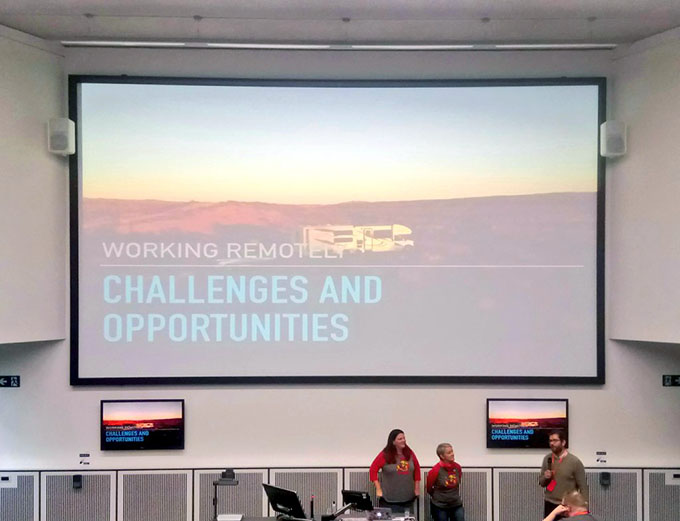It was Halloween weekend in Manchester, which meant some frightening looking characters wandering the street. Thankfully, the attendees at WordCamp Manchester were far friendlier, with some great talks and fantastic venue provided by MMU.
WCMCR followed a slightly different format to the typical WordCamp – instead of a weekend of talks, and the contributor day the preceding Friday or following Monday, it was just a single day of presentations, leading to high-quality talks and a focused event.
There were two tracks – general and a technical, with a good selection of topics to choose from. Here is the full schedule for WordCamp Manchester 2017.
Arrival & Coffee

On arrival, registration was quick and easy. It was great to see from the attendee list so many people I’d previously talked to at WordCamp Edinburgh earlier in the year. The most difficult part was choosing between the tracks when there were two speakers that I really wanted to see. We were assured that all the talks would be available shortly on WordPress.tv, so we wouldn’t miss out.
The Perfect Customer Journey for High-Converting eCommerce Websites

First up was Kathir Sid Vel with a fantastic deconstruction of the key components of a successful ecommerce site. Sid highlighted the importance of trust indicators, such as a solid prominent returns policy, contact details and delivery information.
Though the talk was focused on selling physical products with a platform such as WooCommerce, there were takeaways for all businesses selling online: they need to ensure they convey trust.
At HeroThemes, we put reviews and testimonials from customers on all our product pages to help demonstrate product quality. Our 30 day money back guarantee and instant delivery (download) features are displayed right above the purchase button on the checkout page, to help alleviate common concerns buyers have about completing a purchase.
The Challenges and Opportunities of Remote Work

Automattic, the company behind WordPress.com employees over 450 staff from over 45 countries and they’re mostly remote workers, managing their own schedule and work environment. Two of these Automatticians, Pam Kocke and Karen Arnold shared their experiences and strategies for dealing with some of the common pain points of remote working.
Employers and employees need to address communication, culture and internal oversight when considering remote working. For the employee they may face challenges with loss of focus, staying up-to-date, language difficulties and potentially not leaving the house for days on end.
Selecting the right technology/medium for communication was a key takeaway for me here. Services such as Slack allow for the aggregation of events, sales, email and discussion into one interface to help increase worker involvement and management oversight. It’s beneficial to then filter the stream into channels to split high priority action items from casual watercooler conversations.
Automattic have an annual company-wide conference at an exotic location, while subteams have 2-3 workacations a year. For sole homeworkers, meeting like-minded individuals is key to staying in touch and socializing. At HeroThemes we use meetup to find local tech events in addition to regularly attending WordCamps.
Customizing WooCommerce Themes for Beginners

WooCommerce is one of the most successful ecommerce solutions for WordPress. Maciej Swoboda of WP Desk, a company that specializes in developing extensions for WooCommerce sites, was on hand to provide a beginners guide to customizing WooCommerce themes.
Mac highlighted some of the most useful hooks and filters in the product, using Storefront, the official theme. The talk underlined how powerful the hooks functionality is in WordPress, allowing for extensibility and flexibility in developing and customizing websites.
As an integrator it’s important to understand these hooks, searching a plugin or theme for the do_action and apply_filters calls is a good starting point for this. WP Desk also has Visual Hooks Guide for WooCommerce that shows on screen the hooks executed when page is generated using Storefront, a great resource.
Sound Plugin Creation

Plugins are the way to add functionality to WordPress in an isolated and maintainable way. Mark Wilkinson of Highrise Digital was on hand to discuss important considerations in his talk on the fundamentals of sound plugin creation.
The tenets of Security, Reliability/Scalability, Maintainability, Compatibility, Extensibility and Usability were put forward as the key factors of plugin development. A recommend read was the 10up Engineering Best Practices document that gives an excellent overview of philosophies and design patterns for various web design technologies.
Mark highlighted some great tools that every developer needs to have in their arsenal such as Query Monitor for evaluating code efficiency. Caching resource intensive operations with transients was another top tip for streamlining plugins.
How To Show Your Work to Clients

CJ Andrew’s presentation on his Deployment Practices and Workflow demonstrated how it was possible to show work in progress to clients to develop, test and deploy in a managed way. It was an excellent breakdown of the rationale for making segregated environments with defined interface flows, to showcase progress to clients and get needed content in a timely fashion.
By having the client only ever interact with a staging environment helps ensure the integrity of the live site. This strict chain of command ensures that CJ’s clients appreciate the value of the work being delivered and that there is a documented feedback loop, minimizing scope creep.
Production Ready WordPress

Avoiding repetition in deployment was the crux of Edmund Turbin’s talk on deploying code using version control and continuous integration.
Edmund discussed his development workflow, how a push to a central git repository kicked off the pipeline job consisting of build, package and deploy tasks. This had helped reduce the manual work required to update his site. He also touched on how he was planning to automate integrate and regression testing.
Automation is vital to iterative development projects that have various processes and dependencies to move code between development and production/live. It’s easy to get excited at the potential – code checking, testing, version control, compressing, compiling, deployment etc. tasks can all now be automated with relative ease thanks to the various task runners and the platforms that integrate with them.
In my experience, the secret to successfully implementing continuous integration is to start with one repetitive task and gradually convert manual tasks to automation one-by-one.
For me, this started with the task of compression (zipping) projects ready for distribution. I replaced the onerous task of copying the folder(s), removing any superfluous files, zipping and checking the result with a grunt task requiring a single command to initiate.
Previously, if I noticed a mistake, the whole process would need to be done again, at 2-3 minutes a time including checks. No more. That was two years ago. Now each project checks, builds, deploys and tests autonomously when it’s committed to our code repository.
Lightning Talks

In the final sessions were lightning talks discussing various small tips and ideas.
One highlight was Kayleigh Thorpe from 34SP on getting started with the Yoast plugin, which provided a great overview of the SEO tool. WordPress already has some inbuilt SEO features, but the Yoast plugin allows for greater control and review of these directly from the WordPress dashboard.
Another stand out talk was Amande Tanefo of Launch and Sell on tackling impostor syndrome. A common issue with all but the most confident of individuals. (also check out her feminine WordPress themes, they’re fantastic.)
After Party

The benefit of having a one day was that the after party on the Saturday felt more relaxed given that the presentations were concluded. It was a great opportunity to catch up with familiar faces and chat with the speakers. WCMCR had exclusive use of the top floor of Black Dog Ballroom, a short walk from the venue.
The food was fantastic, not just during the day at MMU, with the excellent in-house catering team but the food at the afterparty was tasty and bountiful. As someone who has recently hosted a large family event myself the importance of feeding your guests can not be underestimated, and WordCamp Manchester did not disappoint.
Drinks and food were sponsored by Capita Translation & Interpreting, I tip my cap to them.
Final Thoughts

WordCamp Manchester was a really enjoyable event. The one day format worked well and there was a good mix of talks from competent speakers. It helped reinvigorate my passion for a number of things we have on at the moment and connect with like minded individuals working on some interesting WordPress projects.
A shout out must go to the lead organizer, Tom Nowell and his team for putting on an awesome show. I’m looking forward the next WordCamps in the UK when they kick off again in the new year.
The post WordCamp Manchester 2017 – A HeroThemes Retrospective appeared first on HeroThemes.